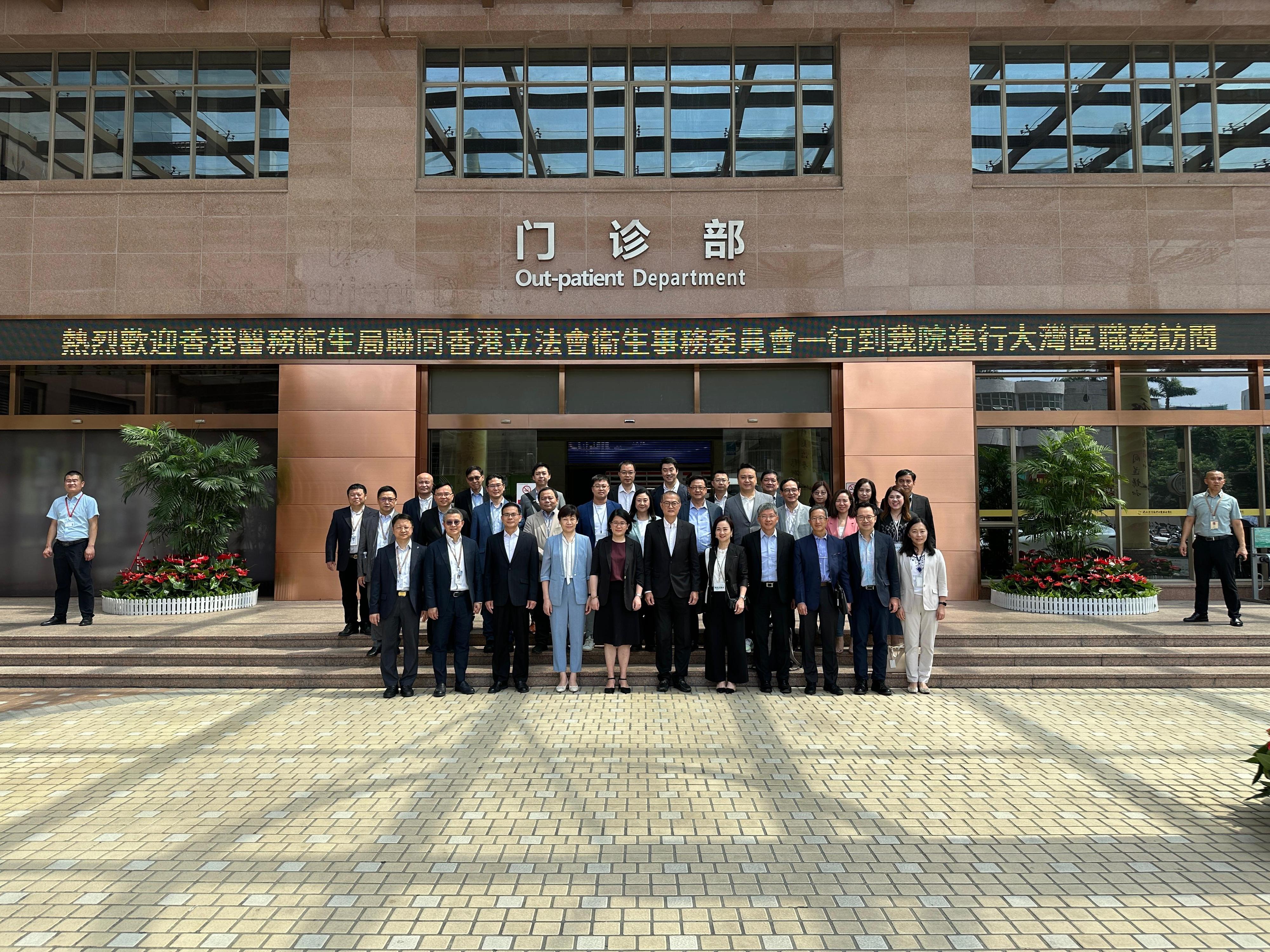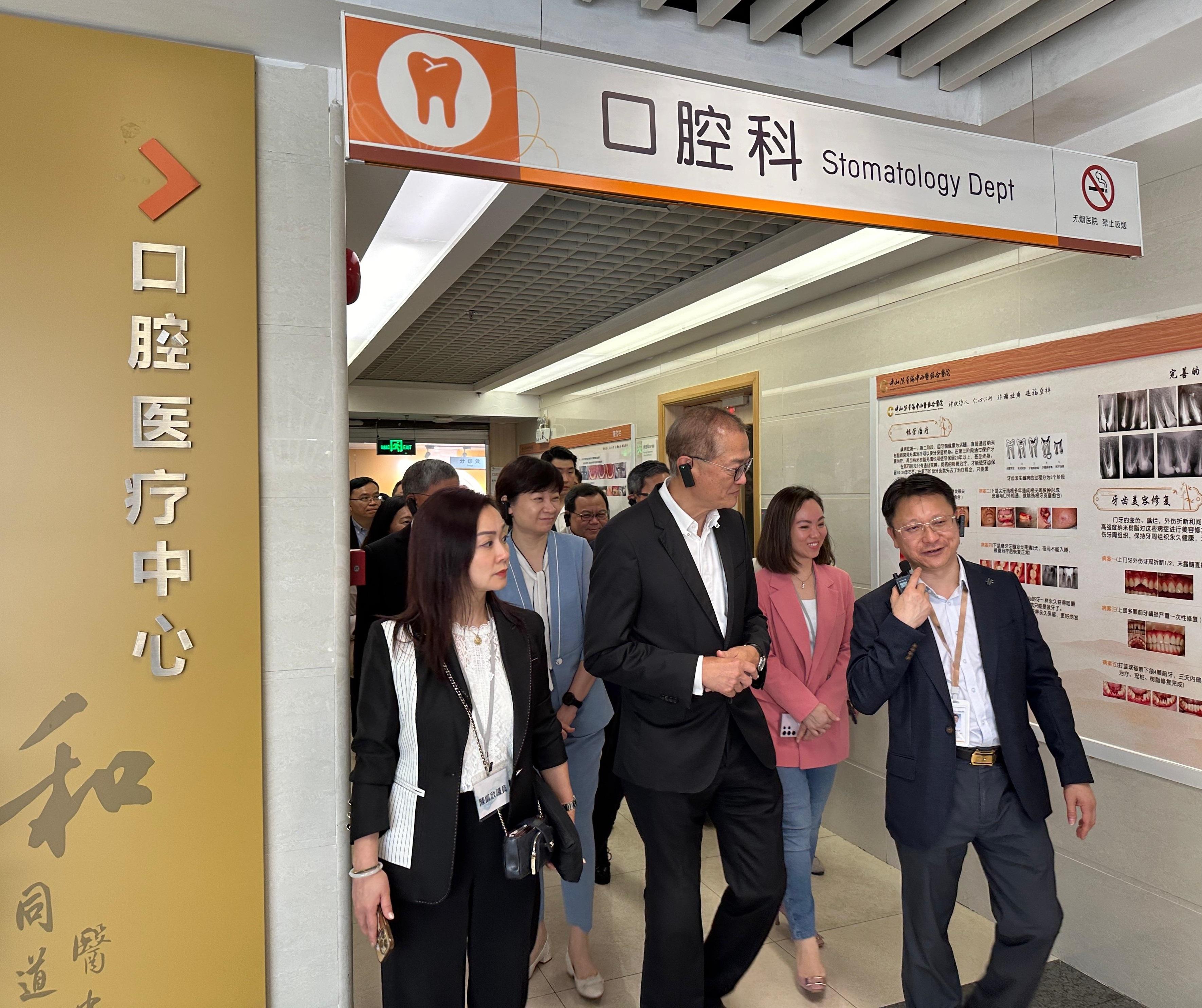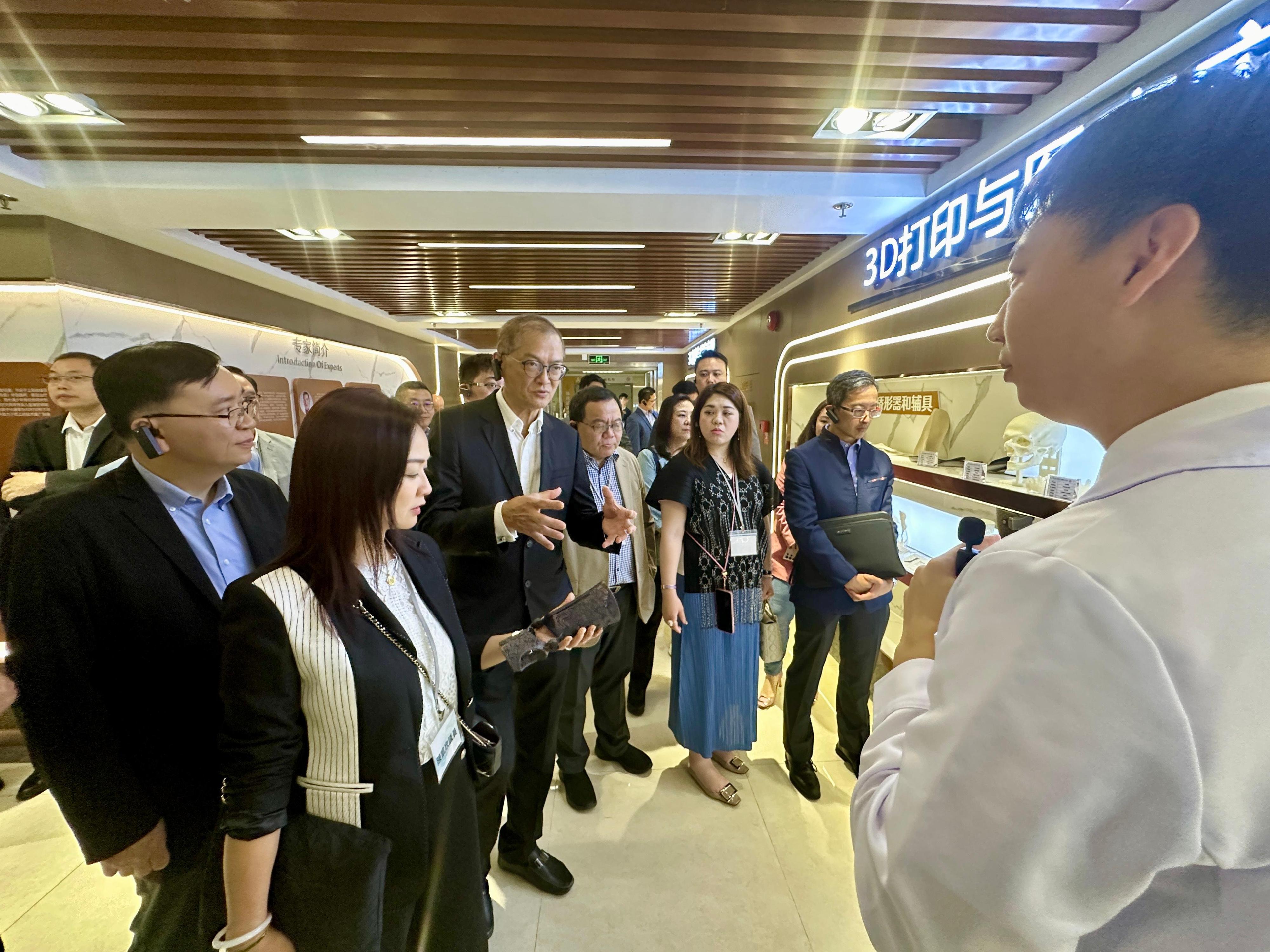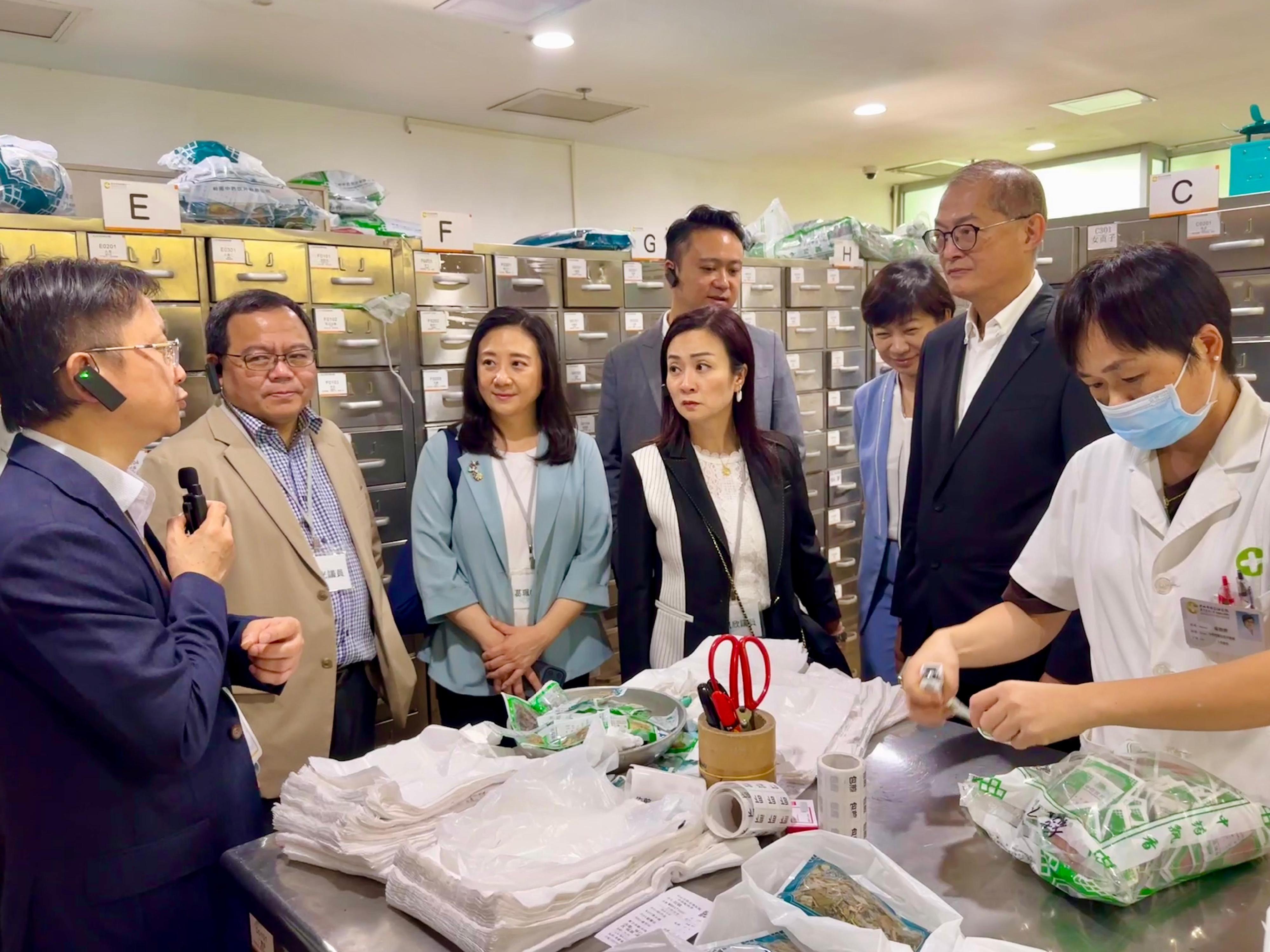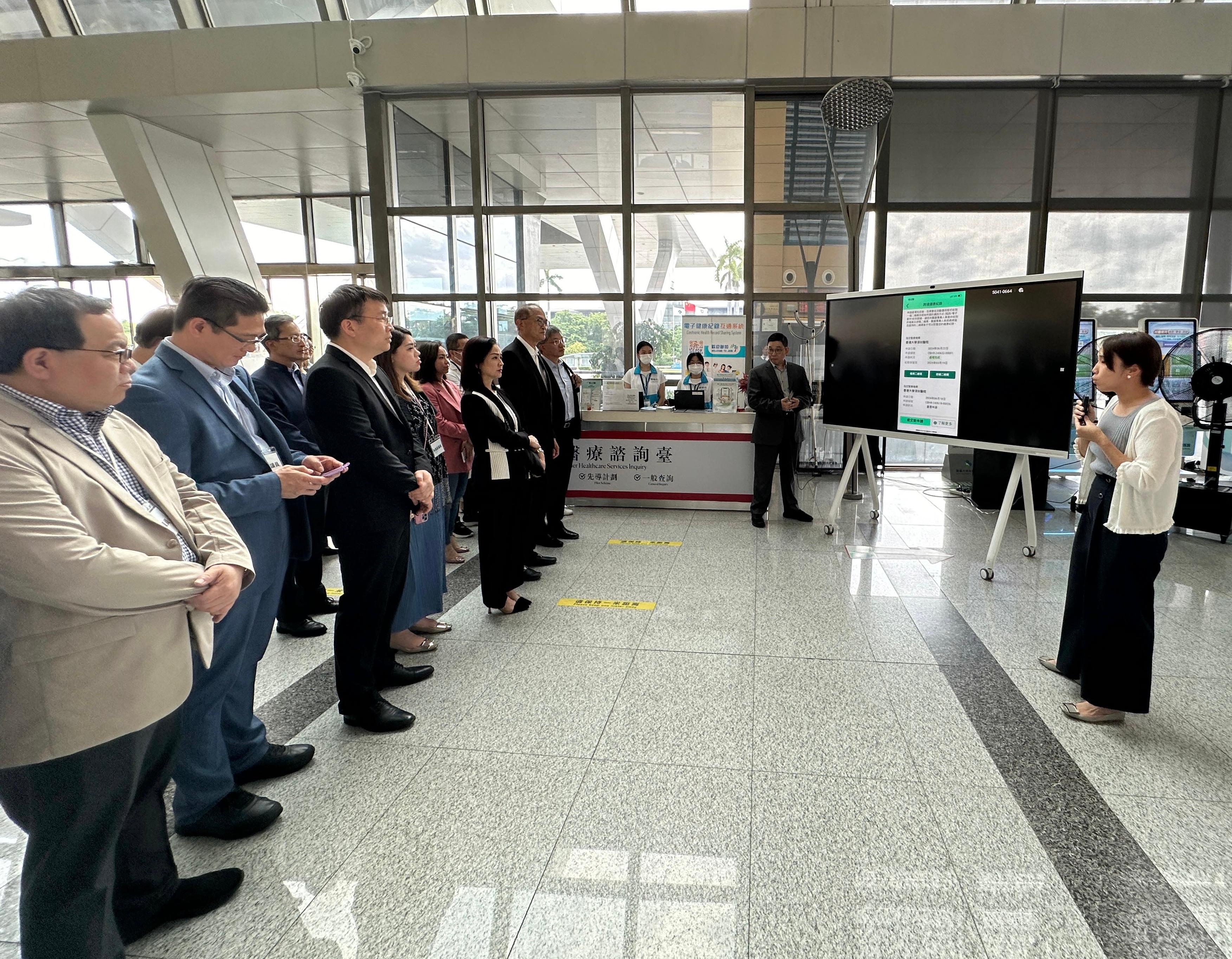The Secretary for Health, Professor Lo Chung-mau, led a delegation comprising representatives of the Health Bureau (HHB), the Department of Health (DH) and the Hospital Authority (HA), together with the Chairman of the Panel on Health Services of the Legislative Council (LegCo), Ms Chan Hoi-yan; and its Deputy Chairman, Dr David Lam; as well as other LegCo Members, to pay a duty visit to two Tier III Class A hospitals in the Guangdong-Hong Kong-Macao Greater Bay Area (GBA), namely ZhongShan Chenxinghai Hospital of Integrated Traditional Chinese and Western Medicine (ZS CXH Hospital) and the University of Hong Kong-Shenzhen Hospital (HKU-SZH), today (June 22). This visit aimed to enable the delegation to have a better grasp of the latest services, facilities and medical standards of Tier III Class A hospitals in the Mainland and exchange views on ways to boost cross-boundary medical collaboration.
The delegation went to ZS CXH Hospital in Zhongshan in the morning. ZS CXH Hospital is the very first Tier III Class A hospital of integrated traditional Chinese and western medicine co-developed by Guangdong and Hong Kong. The hospital was among the first batch of designated healthcare institutions being allowed to use Hong Kong-registered drugs and medical devices used in Hong Kong public hospitals since 2021. It was also included in the Elderly Health Care Voucher Greater Bay Area Pilot Scheme (Pilot Scheme) this February. The delegation toured multiple departments of the hospital, including the Health Management Center, Integrated Endoscopy Center, Health Construction Administration and Rehabilitation Department, International Medical Center, Stomatology Department and 3D Printing Application Center, and had a hands-on experience on the flow of receiving medical services there. Representatives of the hospital also introduced to the delegation the healthcare and supporting services available for Hong Kong and Macao citizens, so as to deepen their understanding of the facilities, operation and service standards of a Tier III Class A hospital in the Mainland.
In the afternoon, the delegation headed to Shenzhen to visit the HKU-SZH. Operated under the model of modern management and co-operation between Hong Kong and Shenzhen, the HKU-SZH is an integrated Tier III Class A hospital which has always been the pilot trial institution and the largest platform for propelling cross-boundary medical collaboration. It is the very first GBA Mainland medical institution where Elderly Health Care Vouchers (EHCVs) can be used to pay for designated out-patient service since 2015. In 2021, the HKU-SZH was designated as the only healthcare institution to implement the measure of using Hong Kong-registered drugs and medical devices used in Hong Kong public hospitals in the GBA on a trial basis, and then became one of the first batch of designated healthcare institutions being allowed to use Hong Kong-registered drugs and medical devices used in Hong Kong public hospitals in the same year. Moreover, the hospital rolled out the Pilot Scheme for Supporting Patients of Hospital Authority in the GBA starting from last year. Having toured departments such as the out-patient pharmacy, the Department of Family Medicine and the Department of Dental Surgery in the hospital, the delegation was also briefed by the representatives of the hospital on the experience and practical arrangement in relation to the provision of cross-boundary medical services.
During the visit at the HKU-SZH, the HHB personnel also introduced the two new functions of the eHealth mobile application, namely "Cross-boundary Health Record" and "Personal Folder", which will be launched at the HKU-SZH on a trial basis from July 15 onwards to facilitate cross-boundary medical collaboration. The "Cross-boundary Health Record" function is only applicable to hospitals outside Hong Kong that are specified and certified by the HHB to ensure the safety of citizens' medical data. The HHB will launch the pilot at the HKU-SZH and the healthcare professionals there will be able to browse the copies of electronic health records deposited in the eHealth accounts of eligible EHCV users over the past three years, upon presentation of relevant QR codes by the elderly persons. Meanwhile, the "Personal Folder" function enables eHealth users to deposit medical records obtained during consultations in medical institutions outside Hong Kong into their eHealth personal accounts, which will facilitate the storage and usage of personal medical records obtained in and outside of Hong Kong. Under the eHealth+ development plan, the HHB will continue to spare no efforts in enhancing the portability and cross-boundary application of electronic health records in a secured and orderly manner, such that Hong Kong citizens can benefit from more coherent healthcare services.
Professor Lo said, "With the more frequent travelling to and fro the Mainland, demand of Hong Kong citizens for healthcare services in the Mainland has been on the rise, while attaching greater importance to Chinese medicine for disease prevention and treatment. Today's exchange programme not only enhanced the delegation's understanding of the services and operation of the Tier III Class A hospitals in the Mainland, but also increased the relevant medical institutions' awareness of the medical needs of Hong Kong citizens, thereby facilitating the launch of cross-boundary medical collaboration in the future and provision of suitable healthcare services to Hong Kong citizens.
"The Chief Executive adopted cross-boundary medical collaboration as one of the subtitles for the first time in his 2023 Policy Address, demonstrating how deep the Hong Kong Special Administrative Region (HKSAR) Government values medical collaboration with the Mainland. We will continue to press ahead with relevant measures at full steam, including the launch of the Pilot Scheme to offer eligible Hong Kong elderly persons additional options of services points for using the EHCVs in the GBA, roll-out of the Pilot Scheme for Direct Cross-Boundary Ambulance Transfer in the GBA, continuous implementation of the Pilot Scheme for Supporting Patients of Hospital Authority in GBA, as well as exploration of strategic purchasing of healthcare services from suitable GBA healthcare institutions for Hong Kong citizens. The HHB will uphold the principles of complementarity and mutual benefits to ramp up healthcare co-operation with various Mainland cities of the GBA on the premise of benefitting the development of the healthcare systems of Hong Kong and the Mainland with the objectives of enhancing the healthcare standards of the two places and pushing forward the national strategy of 'Healthy China' through concerted efforts."
Professor Lo emphasised that the HKSAR Government stays committed to fulfilling the important role of safeguarding the well-being of Hong Kong citizens by continuing to provide them with quality healthcare services and will never shift the responsibility of taking care of the well-being of Hong Kong citizens to the Mainland healthcare system. He said that, in formulating cross-boundary healthcare measures, the HKSAR Government would support the healthcare needs of Hong Kong citizens who choose to pursue development and live in the Mainland, while taking into account the potential impact of the measures on the social resources and livelihood of the citizens in the Mainland.
The Permanent Secretary for Health, Mr Thomas Chan, also joined the visit programme. The delegation returned to Hong Kong in the evening.
Follow this news feed: East Asia






